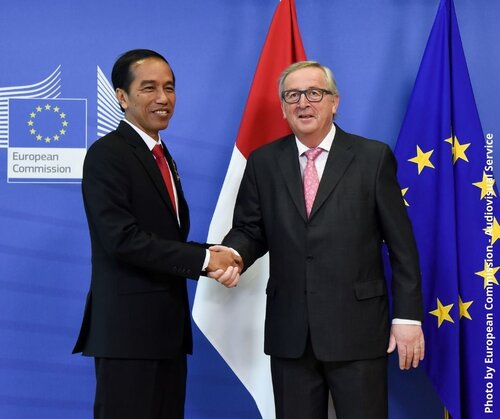
Negotiations for a trade agreement between the EU and Indonesia have slowed down over the past two years, mainly because of the pandemic; but at a webinar on 29 September 2021 both Parties confirmed their commitment to conclude a deal. Given the secrecy surrounding negotiations, and the lack of movement on issues such as palm oil, economic benefits for small-holders’ rights and the impacts of the Omnibus/Job Creation Law on people and forests. Many NGOs feel it would seem more sensible to put negotiations on hold.
Marika Jakas, head of Trade and Economic Affairs at the European Delegation in Indonesia, said negotiations are quite far along, and that about 50 per cent of the agenda has been addressed. The next round is planned for end of October or early November. She underlined that the trade agreement, also known as the Comprehensive Partnership Agreement (CEPA), could bring a 2.3 per cent growth in Gross Domestic Product (GDP) to Indonesia by 2032, and could be significant in terms of transformation towards an industrial economy and of hundreds of thousands of jobs.
The Trade and Sustainable Development (TSD) Chapter remains a stumbling block to securing the other 50 per cent, as it has been since 2017. The EU and Indonesia do not share the same visions of sustainability. While the EU would like to keep the content of the TSD chapter focused on environmental and social dimensions (in the form of vague and aspirational commitments), Indonesia would rather insert an economic dimension into the TSD chapter. This could be done through trade incentives or otherwise rewarding efforts for improved sustainability. When it comes to palm oil trade, Indonesia wants market access preferences for their national certification system for sustainable palm oil (ISPO), which according to a recent study makes little difference to sustainability. And small-holders would have nothing to gain from either negotiation position.
Indonesian NGOs are understandably concerned about the human rights, social and environmental impacts of the agreement: the Indonesian government has not conducted any impact assessment; and all negotiating texts remain confidential and closed to the public. There are no signs that this situation will improve; notably, the participatory process to improve ISPO has failed, and the Omnibus Law, intended to facilitate investment, could be locked into the trade agreement. Potential negative impacts on peoples and forests of the Omnibus Law could therefore be exacerbated by CEPA.
The Omnibus Law's impact on forest protection is already visible: the three-year palm oil moratorium that ended September 2021 (FW 267) has not been extended. It is very unlikely that it will be, as the Indonesia Government argues that the Omnibus Law includes provisions to regulate the palm oil sector.
Indonesian NGOs are calling for a moratorium of CEPA negotiations in order to give a chance to the public to engage in these negotiations and make the deal work for people and the planet.
As the EU is the second-largest importer of palm oil coming from Indonesia, and because approximately 40 per cent of the production comes from palm oil smallholders, it is of utmost importance that CEPA benefit palm oil small-holders in a sustainable manner. It is also imperative that negotiations open space for civil society organisations to participate in discussions –to try to diminish potential negative impacts, and to make it work better for our transitions towards fair and green economies.
Prevention is better than cure: rather than once again wrangling to repair shortcomings after they are embedded in the text (see Brazil, FW 264, FW 267), the EU must ask itself what trade agreements should aim for: reinforcing the corporate capture in global value chains, or supporting green and fair transitions and making transnational companies accountable for environmental and human rights harm.
